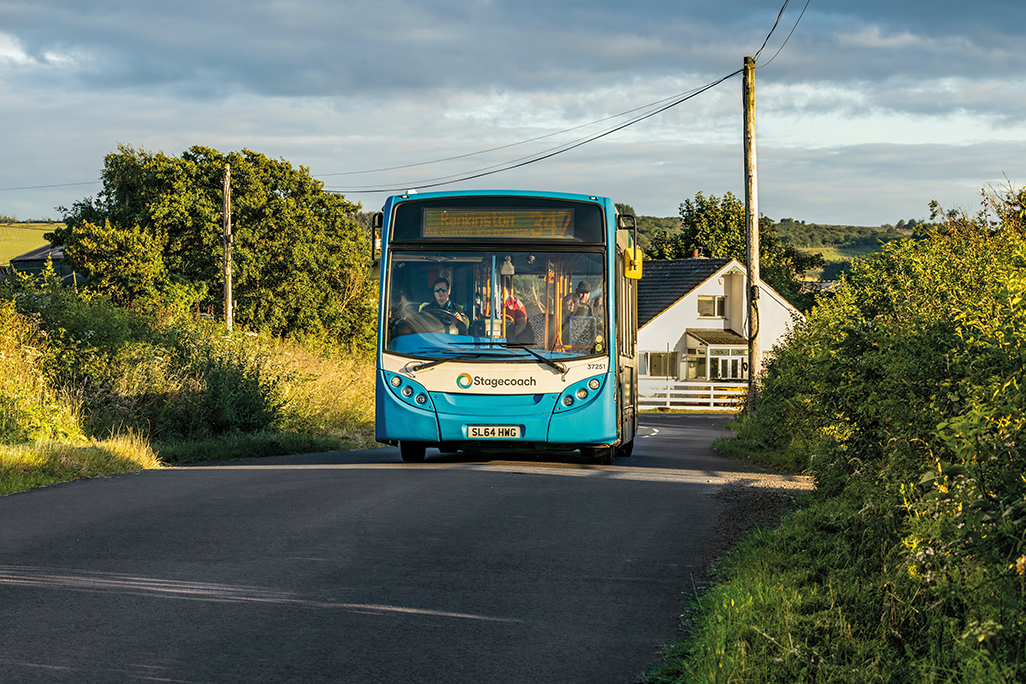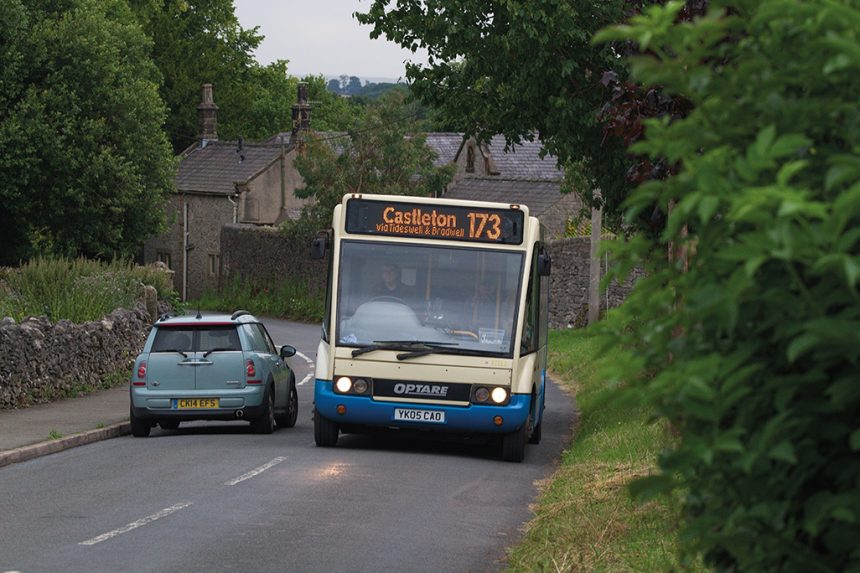Amid the government’s highly publicised promise of a once-in-a-generation revolution in bus services, the spotlight has been shone on the problem of service cuts in rural areas, with the administration opening a call for evidence into the issue.
A report by the County Councils Network published in 2023 highlighted the scale of the problem. It reported that one in four bus routes in county and rural areas had been cut over the previous 10 years.
With rural services rarely able to make a profit, the only solution in many cases tends to be local authority funding.
For example, in Rutland, one of the most rural local authority areas, the majority of the bus mileage is local authority-supported, according to the Department for Transport’s (DfT) annual bus statistics for the year ending March 2024.
However, with such authorities struggling for cash in recent years, it is no wonder that bus services have not been meeting public needs in many areas.
Isle of Wight success
According to those same DfT statistics, Isle of Wight was the only local authority in England to not support a single bus service.
This was for a region in which 3.2 million vehicle miles were operated commercially.
This is particularly notable for one of the most sparsely populated authorities in the country — one that is “mainly rural” according to the government’s 2011 Rural Urban Classification.
Yet, on passenger journeys per head of population, Isle of Wight ranks 16th best out of all 100-plus local authorities in England, with a figure much higher than many urban areas.
It is also 12th best when comparing commercial vehicle mileage to 2019/20, having marginally improved by this measure since pre-COVID.

So what can be learned from how buses operate in the Isle of Wight? It was a pertinent question to ask of Southern Vectis, the island’s principal operator, as the government’s call for evidence closed on 17 January.
Richard Tyldsley, Southern Vectis General Manager, says Isle of Wight’s bus service is “punching well above its weight” when compared to other similarly rural areas.
By way of example and speaking just before the festive period, he was proud to point out that the Go-Ahead subsidiary offers “probably the most complete Christmas Day service in the UK”.
It also provides what is rare outside the big cities — services which operate throughout the night on certain routes.
According to Richard, partnership with the local authority, which at 147 square miles is one of the smallest in the country, has been crucial to the success of the island’s bus services.
“It’s a very small council with not a lot of money, but we’ve always worked with it where we can and it helps support us where they can,” he says.
In addition, Southern Vectis rates highly its close cooperation with the Isle of Wight Destination Business Improvement District and providers of other transport such as ferry to try to ensure it is helping to meet the needs of the public.
One of the eight forms of reference in the government’s call for evidence which is sure to have attracted much feedback is how the government’s proposed reforms of powers over bus services laid out in the Bus Services Bill and recently announced funding “should take into account the particular challenges of rural areas and local authorities outside major cities”.
Support for BSIP
On this subject, Richard favours a partnership approach rather than the franchising route, which has been much touted by ministers but is likely to be less attractive in areas without large conurbations.
Richard, who points out that, since March 2024 when the DfT statistics applied, a very small handful of services are now supported by a Bus Service Improvement Plan (BSIP) and a town parish council, adds: “If there’s more money through BSIPs and things like that that can help pay for those services, why not do that rather than franchising, which will cost millions to put in place and then you still have to fund that rural route?”
Also referred to in that government call for evidence is the part that demand-responsive (DRT) and community transport might be able to play for rural services.
It’s good that there’s discussion around giving back control to local areas – Kerry Booth, Rural Services Network
Isle of Wight does not have DRT, according to Richard, who says: “DRT is always going to need some level of funding — is that a better use of funding than a big bus running round on a timetable all day? In some areas, it probably is.”
More widely, he is proud of a scheme he believes is almost unheard of in the UK in which Southern Vectis works with a local organisation to run community services, providing buses “effectively free” for community transport.
“A lot of places you have community buses, but they’re usually funded whereas here they are a charity, the drivers volunteer their time and we volunteer our vehicles,” he says.
“That picks up some routes that simply wouldn’t exist otherwise.”
Call for government action
South Gloucestershire has been one of many local authorities to have recently made cuts to rural bus services, the ending of routes 84 and 85 there leading to controversial headlines last summer.
These were run by The Big Lemon, which is noted for its community and environmental focus.
The operator’s founder and CEO, Tom Druitt, speaking in response to the government’s call for evidence, calls on politicians to back up with actions their stated targets for the environment and the economy.
“The problem is I think they don’t understand the value of rural services to the community and to the economy,” he says.
“And they talk about economic growth but, if people in rural communities can’t access colleges or apprenticeships or jobs, how can it be expected to grow?
“They talk about climate change but, if there are no rural bus services, how are people expected to leave their cars at home?
“They talk about congestion, but if there are no rural services connecting villages to their local market town, for example, then how are people expected to travel any other way?”
I don’t think rural communities care whether their service is franchised or delivered through the current way – Tom Druitt
He goes on to echo the comments of Kerry Booth, CEO of the Rural Services Network (RSN), which is a special interest group of the Local Government Association which has a membership of local authorities and 520 other service providers.
Kerry says: “Not being able to get out to see people has a really big impact on mental health, which then can have an impact on physical health.
“This almost gets missed in the national conversation about transport.” She also believes that investing more in buses would save costs to the health service which might result from those unable to reach doctors’ surgeries soon enough.

Tom adds: “Rural bus services can solve all of these problems, grow the economy, help reduce the pressure on the NHS and help reduce congestion, pollution, and climate change.
“The frustration that we have, and many rural communities I’m sure will agree, is that governments of all colours talk about the importance of all of these things and yet the only news that rural communities ever seem to get is services being cut.”
When it comes to the discussion over the potential role for franchising in rural services, he adds: “Frankly, I don’t think rural communities care whether their service is franchised or delivered through the current way.
“All they want to see is a regular bus service for their village. It’s up to the government and the industry to work together to identify the most efficient way of providing that.”
The success of Enhanced Partnerships outside of major urban areas comes in for scrutiny as part of the government’s consultation.
On this, Tom says: “Enhanced Partnerships are good but only when they are backed up by sufficient funding.
“BSIPs are probably not the most effective way of delivering high-quality public transport coverage simply because the restrictions on the BSIPs mean that they’re focused on new projects and were not allowed to support existing services.
“In the West of England, for example, we’ve had situations where BSIP money is not allowed to be spent on an existing service, but it has been spent on other projects that are helpful but not as helpful as an existing service that has been allowed to die off.”
Rural Services Network view
RSN was among those feeding back on the government consultation.
Based on feedback received from members, Kerry says the ideal in the Bill to devolve more power over bus services is a positive one.
“It’s good that there’s discussion around giving back control to local areas,” she says. “We want those who know their areas best to be deciding what happens.”
However, she adds that it’s important the government recognises the disparate needs of rural and urban bus users.
“Previous governments talked about making transport services closer to that of London when actually that’s not necessarily what we need in rural areas,” she says.

“I live in a village, I just want to be able to get to the shops, bank, or doctors. I don’t want a bus coming past every 10 minutes because it will have no one on it and that’s not an effective way of running public transport in rural communities.”
The Bill promotes better protection for lifeline services, which are more crucial in countryside areas, proposing such socially vital services “cannot be removed or changed without councils reviewing their ability to serve communities, especially those in rural or deprived areas”.
This is good news, says Kerry, adding: “I think anything that starts to consider the impact of taking away that service is really important for rural communities.
“I do think that giving more local areas the power to control what’s happening is also important, but it does need the funding with it.”
However, to end on a positive note, Kerry, who claims urban authorities spend around three times as much as rural ones on public transport, says: “I’d like to say I’m feeling more optimistic that the funding will follow this time because they can’t give control to local authorities without any funding.
“I’d like to say I’m more glass half-full at the moment that funding will follow but it needs government to understand that those needs are different in rural areas and allocate that funding accordingly.”



























